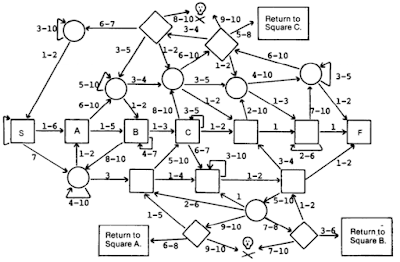Tedium and the Limits of Simulation

If you're a fan of the first edition of Gamma World (or, for that matter, Expedition to the Barriers Peaks), you'll immediately recognize the flowchart above. It's used to simulate a character's attempts to discern the use and operation of a technological artifact. The way it works is relatively straightforward. A token is placed on the square marked "S." Every hour of game time, a player rolls 1d10 up to five times to represent his character's efforts to puzzle out the workings of a piece of high-tech device. The roll is modified by his character's Intelligence score (and the presence of others helping him), The goal is to advance through the flowchart to reach the square marked "F," which indicates success in figuring out how the artifact works. Along the way, there's even the potential that these attempts might result in damage to the character and/or his companions, represented by the skull and crossbones symbols.
I've used this chart or ones like it many times in the past, since figuring out how to operate the tools of the Ancients is an important part of the fun of Gamma World. However, what I noticed is that the fun very quickly dissipates. After a half-dozen or so uses of the chart, the whole process ceases to be enjoyable and simply becomes tedious. I suspect I'm not the only one who felt this way, because the second edition of Gamma World, published in 1983, abandoned the use of these flowcharts entirely, opting for a different system that still involves a lengthy series of die rolls. Having made use of it as well, I can only say that I didn't find it any more consistently fun to use than the flowcharts.
I bring this up not to knock either system. Both are, in my opinion, valiant attempts to present a relatively simple method of simulating something that should be an important part of any post-apocalyptic RPG setting. Unfortunately, they fail – or, at least, they fail to do so in a way that holds up after more than a few uses. This, to mean, is an example of something that most roleplaying games struggle with in one place or another, namely the limits of simulation.
I've been thinking about this over the last week or so, after re-reading the last two issues of White Dwarf, which include details of a system for crafting magic items. I think most people would agree that the making of a magic item, especially something as impressive as a magic sword or a staff, should be an involved and difficult process, one that requires time, effort, and significant resources. Ideally, it should also be the foundation of many sessions of engaging activity by the player characters. In practice, though, I've generally found the opposite. Rather than being engaging, they've been enervating, often to the point where a player eventually decides that it's simply not worth all the effort.
That's a real shame. On the other hand, it's not an uncommon problem in many (probably most) RPGs of my acquaintance. There are many activities that, from a "dramatic" point of view, which is to say, from the perspective of a character living within a given imaginary setting, ought to be both significant and compelling. Yet, these are quite hard to simulate within a roleplaying game without bogging gameplay down in tedious detail. Research, whether of forgotten lore or the mysteries of spellcraft, is another example of the kind of thing of which I'm thinking. Poring over a blasphemous tome to unlock its secrets is a momentous endeavor for a character, but how best to handle it via game rules?
I suspect there is no single answer to that or any other question. Naturally, each player has varying degrees of interest and indeed tolerance for devoting precious game time to the simulation of certain activities. What seems tedious to one might well represent the epitome of pleasure for another. We see this all the time in debates over, for instance, how complex and detailed combat ought to be. For some, D&D's very abstract combat is more than sufficient, while, for others, nothing short of Rolemaster will do the trick. If that sounds like I'm waffling on the matter, I suppose I am, but that doesn't make it any less true.
James Maliszewski's Blog
- James Maliszewski's profile
- 3 followers



